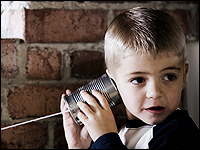It’s no secret that diagnoses like ADD and ADHD have been seen with much greater frequency in the last decade or so. Slight variations on the same theme, both of these disorders have to do with a person’s (usually a child) inability to appropriately control their impulses and behave appropriately.
The debate about the sources of the large increase in these diagnoses is still ongoing. Some think that they are nothing but an inflated push for pharmaceutical treatment by those who stand to profit from the sale of Adderall, Ritalin, and the likes.
However, if you talk to the parents of the children being diagnosed with these disorders, they’ll be the first to tell you that even though they can’t put their fingers on it, something’s up with their kids…
A recent educational program in New Jersey (at the Geraldyn O. Foster Early Childhood Center) tries to instill in children the concept of internal regulation by making pretend play rules explicit. Children talk to their teachers before embarking on their next imaginary adventure in order to lay out everybody’s role. The idea is that by the generation of internal rules, the children become more aware of how social rules regarding behavior are dependent on their specific role in a given environment.
The creators of the program believe that children’s play in the recent past has become more and more structured. They believe that video-games, explicit toys, and constant oversight have reduced children’s ability to take on roles and depend on their own mind for the rules of behavior.
Adele Diamond, a researcher at the University of British Columbia, has found that children in the program performed much better (up to 35% better) than other children in tests of executive function.
More research on this program is ongoing, but the initial results seem to indicate that educational and developmental aspects of a child’s life can impact their ability to have internal oversight. This is obviously promising and upsetting all at once.
No parent intentionally places their child at a disadvantage, but it seems that the most recent trends of “electronic babysitting” we’ve become so accustomed to may in fact be impacting children in unintended, discouraging ways.
The connection to addiction again has to do with general impulse control problems. Less executive control leaves children generally more vulnerable to behaviors that can be detrimental to their future. As I’d mentioned in my very first post, most of the negative impact of drug use on the lives of users is not related to long term addictive use. Instead, it is the accute (as in quick) negative impact of things like unintended pregnancy, motor accidents, and legal troubles and arrest, that end up impacting adolescent drug users.
Maybe by making our children better able to control their actions, we can protect them from a host of possible problems, including drug use…
Question of the day:
How much of your childhood was spent in relatively free play and how much of it was structured?
How, if at all, do you feel that these different activities have affected the kind of self-control you can, or can’t exert?
